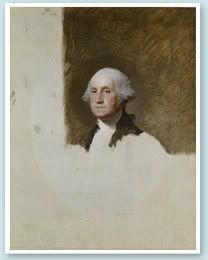 |
The Athenaeum Portrait, 1796.
By Stuart Gilbert
["Forces of Nature" is my post on Gilbert's many portraits of George Washington]
-------------------------------------------------------------------------
Paul Cella, over at What's Wrong with the World has a long article on the commercial republic. These ideas are new to me, but they feel intuitively right. For now, I will just quote the section that left an impression on me. Cella writes:
The framework of thinking and working out constitutionalism set down by Publius is, in my opinion, rightly called a theory of commercial republic. It contrasts with the British system, where republicanism is grafted on to strong remnants of the modified ancient regime. It contrasts with the French system, where republicanism takes on an almost Roman or Rousseauian severity, and the people, having thrown down the crown, do not scruple to take on property as well. French democracy races off toward socialism, while British democracy retreats back, after the initial plunder of the Church, into the arms of a vague but perceptible traditionalism, ever reforming, ever compromising. But in America, the commercial interest itself becomes the bulwark of liberty. How this is accomplished is a complicated matter, which I have only sketched in very brief remarks; but I do think that its practical success bears out historically that a commercial republic is a workable form of government. Publius does not teach nonsense; he teaches that middle class democracy can successfully be made out of the striving and hard-working enterprisers from among the people, toiling under conditions of equality.I was recently skimming through books on Washington, and what struck me was that he was an accomplished businessman. On the wider world of the web, I found this account (pdf) on his entrepreneurial spirit:
Among his many talents, George Washington was a dedicated businessman who had a great vision for the future of America and his own private affairs based on his hopes for the westward expansion of the nation he helped create. His personal business was agriculture, but he knew how to measure the value of land as a trained surveyor, and invested in related industries such as the manufacture of whiskey and the milling of flour.